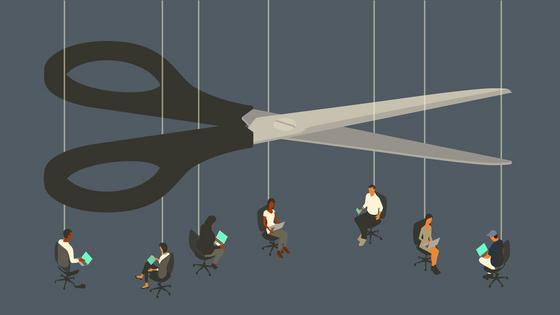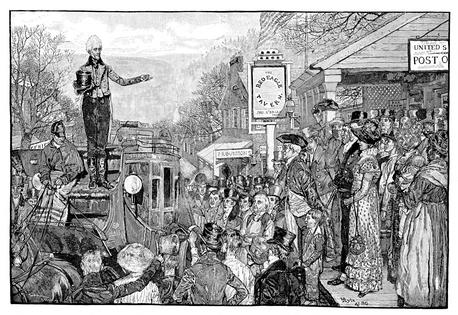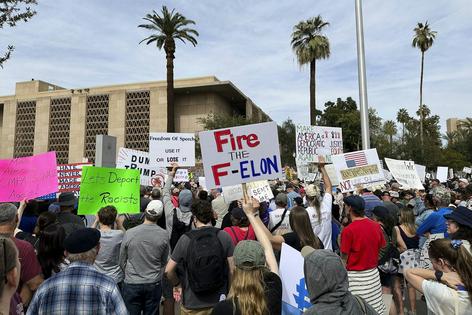Trump’s moves to strip employment protections from federal workers threaten to make government function worse – not better
Published in News & Features
On top of efforts to fire potentially tens of thousands of federal workers, an early executive order from President Donald Trump’s second term seeks to reclassify the employment status of as many as 50,000 other federal workers – out of more than 2 million total – to make them easier for the president to fire as well.
The order has already been challenged in court by two federal workers’ unions and other interest groups, though no judge has yet issued any orders. The Trump administration is drafting rules to put the order into effect.
The Conversation U.S. politics editor Jeff Inglis spoke to James Perry, a scholar of public affairs at Indiana University, Bloomington, to understand what the order is trying to achieve and how it would affect federal workers, the government and the American public. What follows is an edited transcript of the discussion.
What is the standard situation for government employees?
In the 1820s and 1830s, President Andrew Jackson popularized the idea that the president could, and should, hire supporters into government jobs. But by the early 1880s, there was concern on the parts of both Democrats and Republicans that the victor would control a lot of workers who would serve the president, not the American people whose tax dollars paid their salaries.
So the parties came together in 1883 to pass the Pendleton Act stipulating that government workers are hired based on their skills and abilities, not their political views. That law was updated in 1978 with the Civil Service Reform Act, which added more protections for workers against being fired for political reasons.
Those rules cover about 99% of staff in the federal civil service. Currently, there are just about 4,000 political appointees. I’ve seen various estimates that this new executive order would shift at least 50,000 positions from career positions to the political-appointments list.
Some states, such as Mississippi, Texas, Georgia and Florida, have moved to strip employment protections from state government employees, turning protected employees into at-will workers, who can be fired at any time for any reason. These are largely red states, with strong control by Republican governors. Supporters of this move at the federal level argue that at-will employment can work in federal civil service.
This argument is not backed by strong evidence. The evidence supporters offer is that human resources directors, who are often appointees of the governor who changed the statute, claim no one has complained about the change in policy. But that doesn’t include people who are likely to have a different perspective.
It could be that nobody is talking about people being fired for political reasons in these states because they are afraid of getting fired themselves.
What does this executive order change, and why?
The rationale for the new policy is that the administration wants to get rid of federal workers whom leaders perceive as either intransigent or insubordinate – or who they fear might oppose Trump’s policy initiatives. This sets up a conflict between how government workers see their duties and how Trump appears to view them.
Federal employees interviewed by sociologist Jamie Kucinskas during Trump’s first term say they are obligated to look beyond the president’s bidding: They took an oath to the Constitution when they started their jobs, and their salaries and benefits are paid for with taxpayer dollars.
Trump, by contrast, says workers in the executive branch must answer to him and follow his orders.
Trump and others have tried to cloak this effort in language about removing workers who perform poorly at their jobs. That concern is legitimate. The Federal Employee Viewpoint Survey, which surveys hundreds of thousands of federal workers every year about various aspects of their work and working conditions, indicates that in 2024, 40% of those surveyed said people who perform poorly are not fired and do not improve.
But taking action against only 50,000 of the 2 million-plus federal employees isn’t going to address such a wide problem.
There’s a stereotype that in government it can be hard to discipline or fire workers who are not competent at their jobs. The flip side of that stereotype is, however, false: Private businesses are not better at holding poor performers accountable. Survey evidence shows the private sector has just as much difficulty as the government with getting workers to perform effectively.
There’s room for legitimate disagreement about how far federal employees have to go to comply with presidential directives. The people who think loyalty is the key to merit still might not agree on whether that loyalty is owed to the person sitting in the Oval Office or to the Constitution.
How does this affect government workers?
It’s not clear which positions might be targeted. The order calls them “policy influencing positions,” but drawing the line between policy and administration isn’t always easy.
It’s also not clear whether the change will stick. When the George W. Bush administration reduced job protections for Department of Homeland Security employees in 2005, a major federal workers’ union sued the administration and won.
In the first round of this effort under the first Trump administration, it seemed that most of the people affected would be at the top of the federal hierarchy, probably mostly based in Washington, D.C.
Most of the workers in the federal civil service, though, are not there. They work for the Social Security Administration, giving out checks in Bloomington, Indiana, or other departments and offices around the country. It would be very difficult to classify them as influencing political policy or advocating for policies.
But there are people who are not Senate-confirmed who do have an influence on policy. For instance, at the Department of Justice, assistant and deputy assistant secretaries have influence on civil rights policy or other policies that affect the president’s ability to pursue his agenda. The February 2025 resignation of Danielle Sassoon from her role as U.S. attorney in New York is an example of legitimate divergence between an appointee and the president’s policy direction.
Any workers who lost their protections would likely feel threatened with losing their job and their livelihood. They might, out of fear, be more responsive to the dictates of their superiors.
That might sound good – that if you do what your boss says, you’re doing a good job. But it’s different if your obligations are to the public interest and the Constitution.
How does this affect everyday Americans?
Large majorities of Americans believe government workers are serving the public over themselves. And as many as 87% of Americans say they want a merit-based, politically neutral civil service.
The U.S. has attracted to government service workers who are good at their jobs and able to remain politically neutral at work. Saying that’s no longer important would change the relationship between government workers and their jobs. And it would hurt the nation as a whole if government cannot attract the best and the brightest, or if it sends the best and the brightest packing because they are not comfortable with their work situation, or if they stay but their performance declines.
This article is republished from The Conversation, a nonprofit, independent news organization bringing you facts and trustworthy analysis to help you make sense of our complex world. It was written by: James L. Perry, Indiana University
Read more:
Firing civil servants and dismantling government departments is how aspiring strongmen consolidate personal power – lessons from around the globe
Politicians may rail against the ‘deep state,’ but research shows federal workers are effective and committed, not subversive
The dangers of ‘Jekyll and Hyde leadership’: Why making amends after workplace abuse can hurt more than it helps
James L. Perry does not work for, consult, own shares in or receive funding from any company or organization that would benefit from this article, and has disclosed no relevant affiliations beyond their academic appointment.













Comments